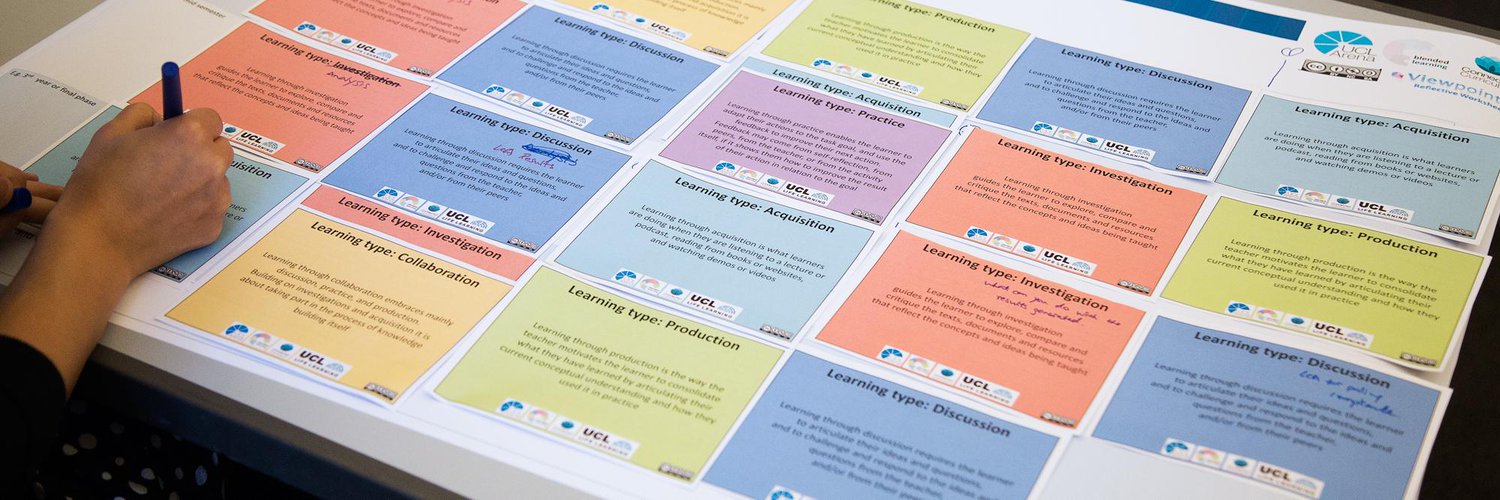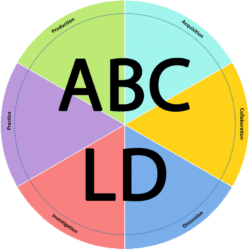What is the ABC LD Toolkit?
Download overview of these pages EDEN 2020 ABC LD Toolkit CY-NP (final) paper submitted for EDEN conference June 2020 (PDF)
Since being launched in 2015, UCL’s ABC learning design method (Young and Perović, 2016) has been widely adopted across universities in Europe and beyond. It is also being used in training, secondary education and other education -related sectors. The core of ABC LD is a highly successful sprint workshop format that engages academic teams in programme and module (re)design. Rapid institutional transition towards online learning due the Covid 19 pandemic has, if anything, reinforced the value of ABC LD’s sprint approach. The suspension of live group work has disallowed the original format but the community of ABC LD enthusiasts has responded with energy and imagination to produce online ABC LD approaches that capture the essence of the method.
The Toolkit (2020) is a series of seven guides with accompanying resources that was co-produced in 2020 as the main output of the Erasmus+ project ABC to VLE. The project was led by UCL and brought together 12 other universities to further develop, localise and evaluate the ABC LD learning design method. The partners were; University College Absalon, University of Amsterdam, Dublin City University, University of Helsinki, KU Leuven, University of Milan, University of Oxford (associate partner), Sorbonne University, Tallinn University, Polytechnic University of Timişoara, VIVES University of Applied Sciences, University College London (lead), and SRCE University of Zagreb. Some were already using the method and others were keen to try it. The project was focused on institutional adoptions of ABC LD, user experiences and how the designs could link to the local technical environment, and particularly their virtual learning environment (VLE) such as Moodle, Canvas or Blackboard. The project was still underway when the pandemic struck, so we were able to respond to the crisis by developing extra material, with input from the wider community. The main part of the Toolkit focuses on the original or ‘base’ format and its variants. We are confident that we will be able to facilitate live workshops again soon. In the meantime, the core principles of co-design by teaching teams, apply to online as much as face-to-face activities and we are excited by the possibilities of the new online adaptations.
The seven Toolkit guides
The guides (Parts 1 to 7) are not intended to be read in sequence, as many users will already be familiar with ABC LD method. Some knowledge from earlier guides may be assumed, though, in later ones. They are supported by a set of downloadable Toolkit 2020 Resources. The titles are as follows.
- Introducing ABC learning design – an overview of the principles.
- Base ABC LD and translations – how the live workshops run.
- Localising ABC – integrating ABC LD in local initiatives and policies.
- ABC LD and the VLE – moving from designs to technical implementation.
- Does ABC LD work? – the evaluation of ABC LD method.
- Online ABC LD (Covid versions) – different approaches to replacing the live workshops
- Community: the future of ABC LD – building the community and sharing practice.
The seven short guides, presented as an online resource, provide a cohesive narrative thread linking the various components of ABC LD method. The real value in the Toolkit however is the resource collection; tools, examples, variations and evaluations produced during the project and via the wider ABC LD community. These resources are linked from the Guides to enable those interested in the method to ‘dive deeper’ at any point into specific resources, examples and ideas. Remember you can also download them from the Toolkit 2020 Resources section.
How the Toolkit is intended to be used
The guides address five user scenarios.
- If you are new to ABC LD, we’d suggest you start with Part 1. This guide introduces the underpinning theory, derived from Professor Diana Laurillard’s ‘Conversational Framework’ (2002, 2012) and her concept of ‘learning types’. Videos from the live workshop give an impression of its dynamics, and the recorded explanations by Dr Clive Young and Nataša Perović (the co-creators of the ABC LD method) expand on how this version works and why.
- If you are interested in running ABC LD workshop, Part 2 breaks down the workflow of the original ‘Base’ UCL version and introduces some variations from the Erasmus+ project partners and others. Part of the ethos of ABC LD method is to encourage and enable localisation. All ABC LD resources are downloadable and released under Creative Commons Attribution-NonCommercial-ShareAlike 4.0 International (CC BY-NC-SA 4.0) license. You can adapt them to your needs, providing you keep the original attribution (and ideally share with the community). Part 2 provides ideas on how to do this.’
- If you want to run an online ABC LD workshop, Part 6 offers some alternatives from the project and the community. Again, developers have been generous in providing resources. It is still probably best to look at Part 2 to see what the intended outcomes are and you will want to look at Part 4 and the technology support model. Look for the ABC LD ‘tool wheel’ (or ‘app wheel’) for an interesting way to link pedagogical approaches to the tools available.
- If you want to adopt ABC LD method in your institution then Part 3 will provide some inspiration, and if you need evidence (for your management) or convincing (for you), Part 5 and the evaluation of ABC LD provides an interesting and positive story.
- If you want to join the ABC LD community, and/or create a local network, then Part 7 lists some ideas we have used in the project and beyond.
For even more inspiration, the guides link to the Erasmus+ project case studies. These give more detail about how ABC is used in practice in a range of contexts.


